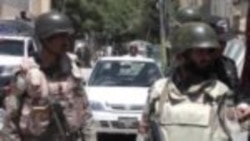QUETTA —
The people of Pakistan’s Baluchistan province are caught in a crossfire of violence from separatist, ethnic, tribal and political conflicts. The May 11 national elections are proving a tough challenge for candidates, security forces and voters alike.
In recent months in Baluchistan, multiple bomb and grenade attacks, shootings and threats of violence, have meant few large political rallies during campaign season.
A bomb blast earlier this year targeting Hazara Shi’ites left scores dead and wounded.
A bomb went off on this street in January, killing almost 85 people. It is a tense time here in Baluchistan with the elections about to happen. Police are trying to secure the streets and make sure the voters can get to the polling station.”
Candidates, like ethnic Hazara leader Abdul Khaliq Hazara, who narrowly escaped that attack, say they are being threatened daily.
“I want to tell you only one thing: that we cannot move properly here in the clear," said Hazara. "Still I think there is complete uncertainty. We are running our election campaigning under the shadow of terror.”
Federal Capital, Islamabad - 2 seats
Punjab Province - 183 seats
Sindh Province - 75 seats
Khyber Pakhtunkhaw Province - 43 seats
Baluchistan Province - 17 seats
Despite the deployment of 70,000 security forces for the vote, the situation is too risky for EU poll observers. But Quetta police chief Mir Zubair Mehmood says authorities are doing their best to protect candidates and voters.
“There is [a] problem, but as far as the elections are concerned, all resources pooled to make sure the election process is held in a fair, free and proper manner, and maximum security, which state can provide should be provided not only to the people but the candidates as well," said Mehmood.
Despite those assurances, expectations are low.
Chief secretary Babar Yaqoob Fateh Muhammad says turnout in Baluchistan was just 30 percent, in 2008.
“So, in terms of percentage, I would be very happy if we are, let’s say, equal the last elections turnout, that would be very decent," said Muhammad.
Baluch nationalists boycotted the last polls, but returned to campaigning this year to gain influence in the central government. Now they are targeted by separatist Baluch militants who are rejecting the poll and using text messages and letters to threaten voters.
Naimatullah Gichki, a senior member of a Baluch party, the National Party, says although many people are scared, any turnout is important.
“We cannot get out of our houses, our people go in the house and hold the [political] meetings, corner meetings, for instance, their houses, there are bomb blasts there and fires against them. I know it’s very tough. The results we don’t care. Whatever the results we must get some representation," said Gichki.
As the campaign head into the final days, the Baluchistan vote is becoming a contest between those who believe in participating in the political process - and those who reject it.
In recent months in Baluchistan, multiple bomb and grenade attacks, shootings and threats of violence, have meant few large political rallies during campaign season.
A bomb blast earlier this year targeting Hazara Shi’ites left scores dead and wounded.
A bomb went off on this street in January, killing almost 85 people. It is a tense time here in Baluchistan with the elections about to happen. Police are trying to secure the streets and make sure the voters can get to the polling station.”
Candidates, like ethnic Hazara leader Abdul Khaliq Hazara, who narrowly escaped that attack, say they are being threatened daily.
“I want to tell you only one thing: that we cannot move properly here in the clear," said Hazara. "Still I think there is complete uncertainty. We are running our election campaigning under the shadow of terror.”
Pakistan Elections - What's at Stake?
What's at Stake?- Voters choose members of the National Assembly, or lower house parliament
- 342 seats, 60 are reserved for women, 10 are reserved for religious minorities
- Seats are distributed by region:
Federal Capital, Islamabad - 2 seats
Punjab Province - 183 seats
Sindh Province - 75 seats
Khyber Pakhtunkhaw Province - 43 seats
Baluchistan Province - 17 seats
- Voters also electing members of four provincial assemblies
“There is [a] problem, but as far as the elections are concerned, all resources pooled to make sure the election process is held in a fair, free and proper manner, and maximum security, which state can provide should be provided not only to the people but the candidates as well," said Mehmood.
Despite those assurances, expectations are low.
Chief secretary Babar Yaqoob Fateh Muhammad says turnout in Baluchistan was just 30 percent, in 2008.
“So, in terms of percentage, I would be very happy if we are, let’s say, equal the last elections turnout, that would be very decent," said Muhammad.
Baluch nationalists boycotted the last polls, but returned to campaigning this year to gain influence in the central government. Now they are targeted by separatist Baluch militants who are rejecting the poll and using text messages and letters to threaten voters.
Naimatullah Gichki, a senior member of a Baluch party, the National Party, says although many people are scared, any turnout is important.
“We cannot get out of our houses, our people go in the house and hold the [political] meetings, corner meetings, for instance, their houses, there are bomb blasts there and fires against them. I know it’s very tough. The results we don’t care. Whatever the results we must get some representation," said Gichki.
As the campaign head into the final days, the Baluchistan vote is becoming a contest between those who believe in participating in the political process - and those who reject it.






